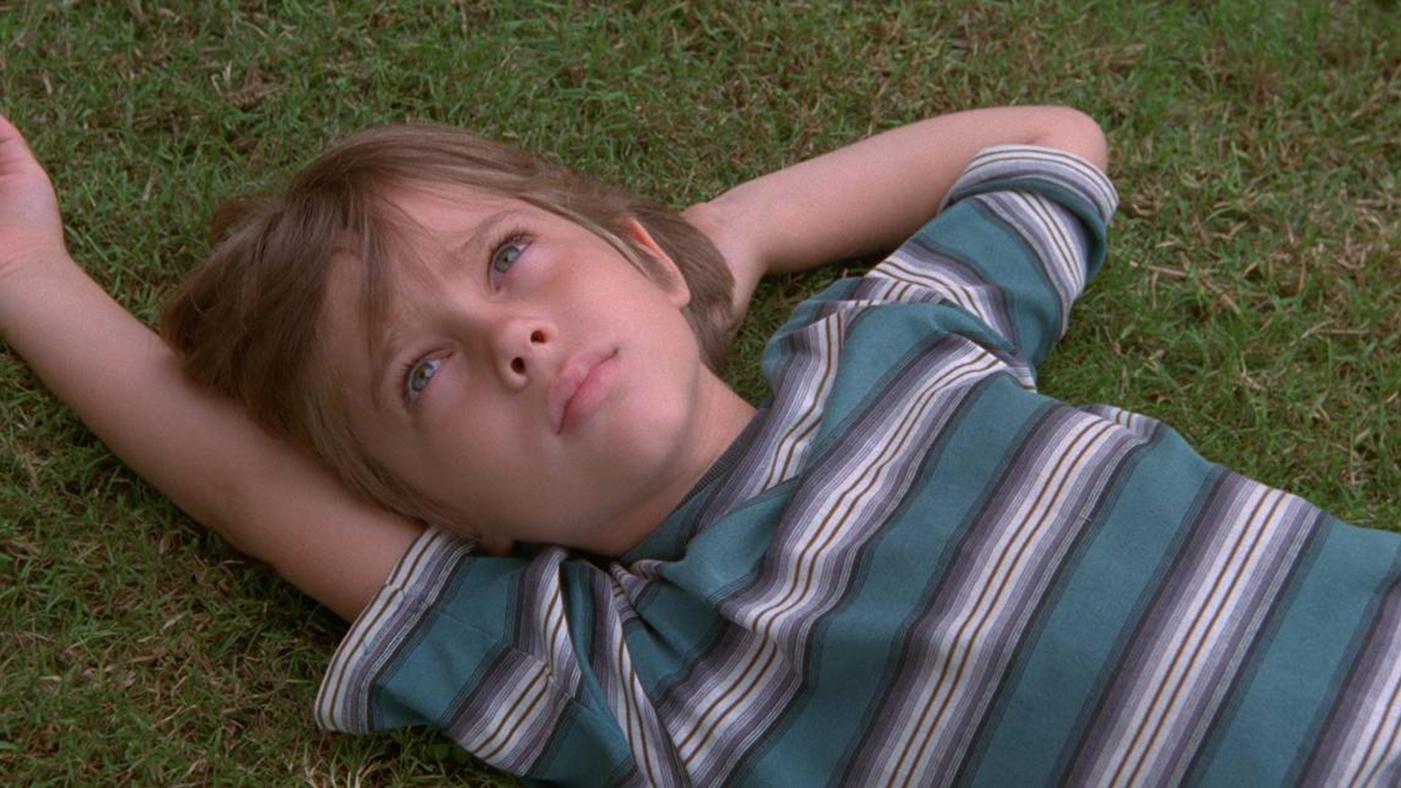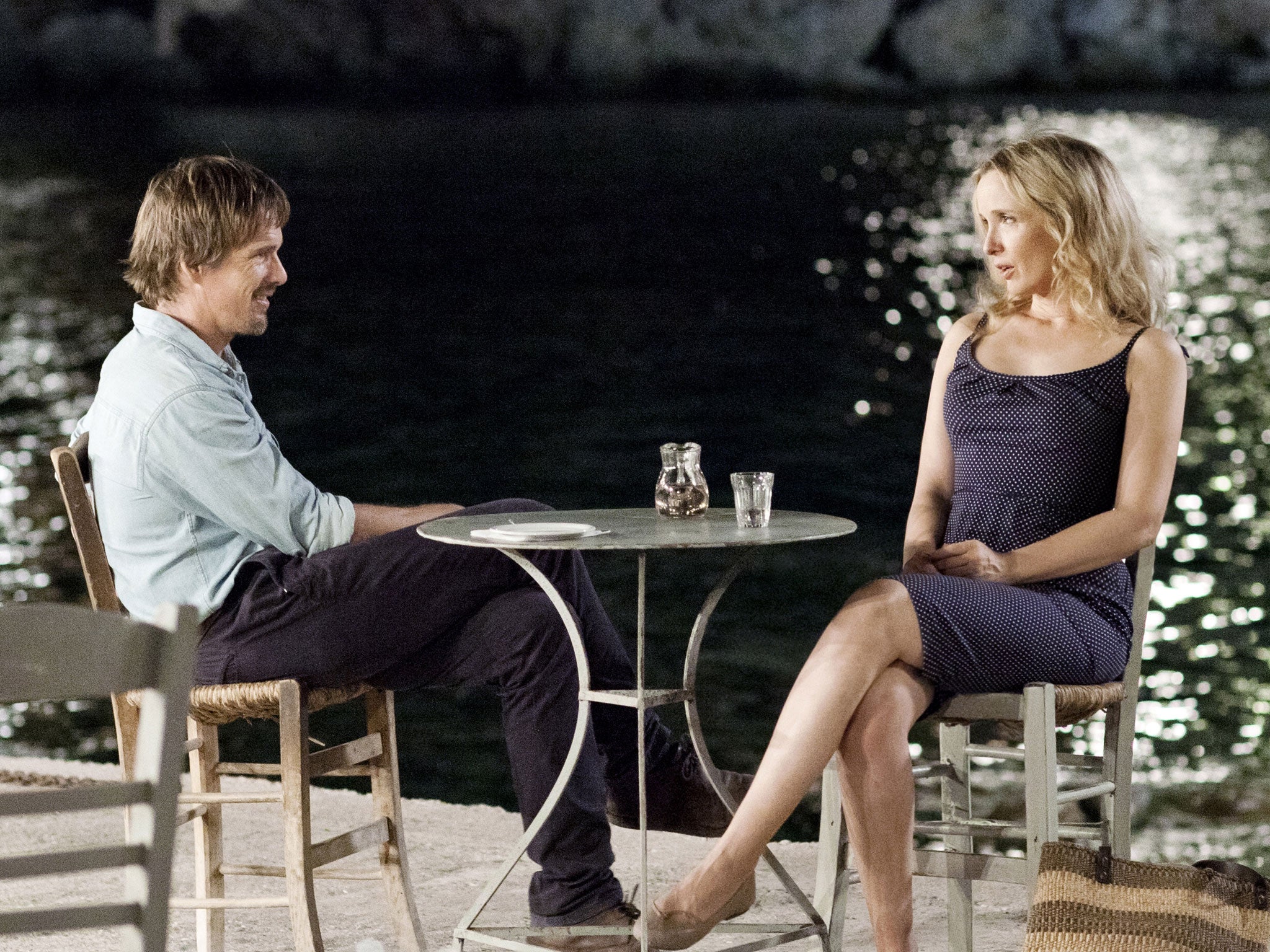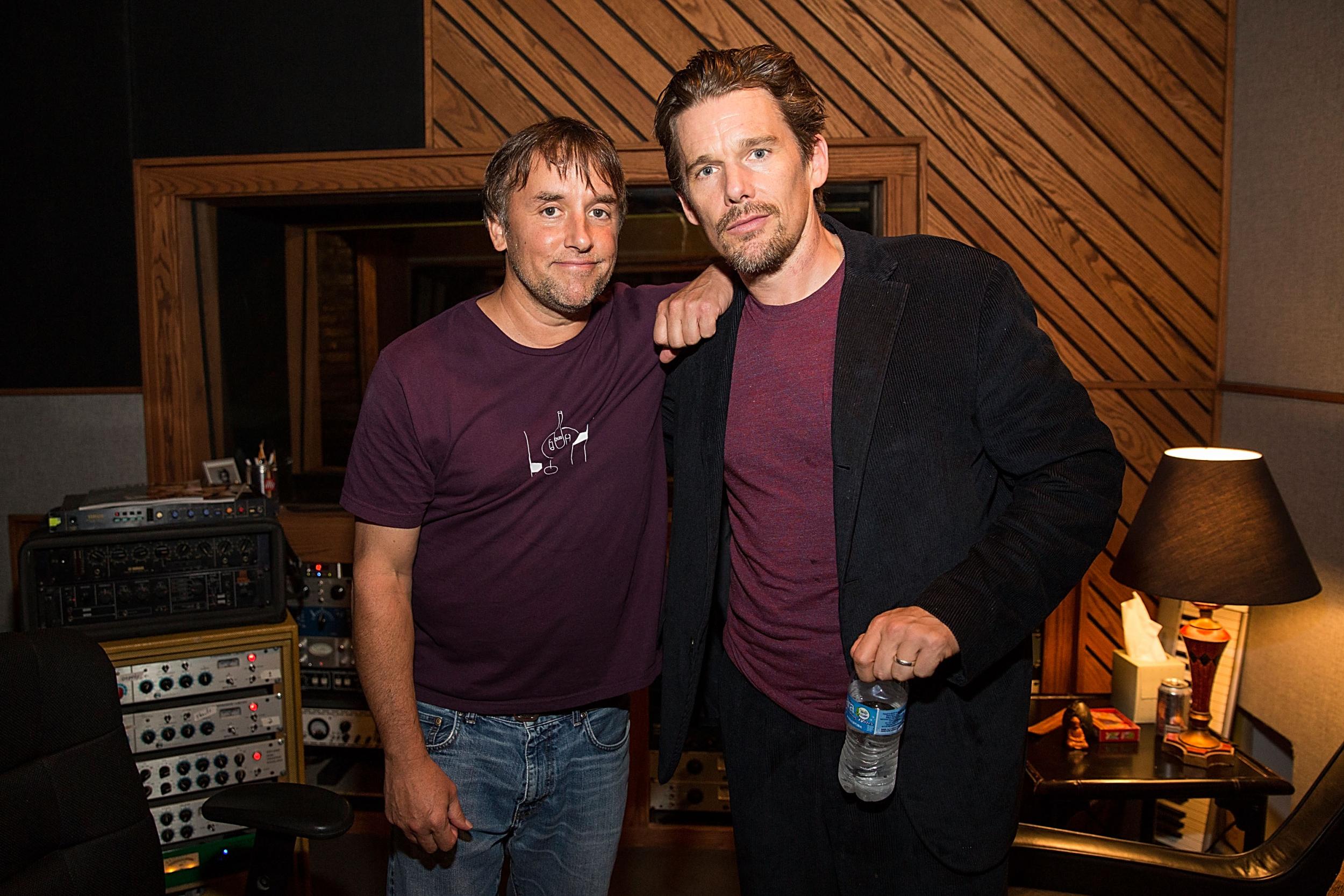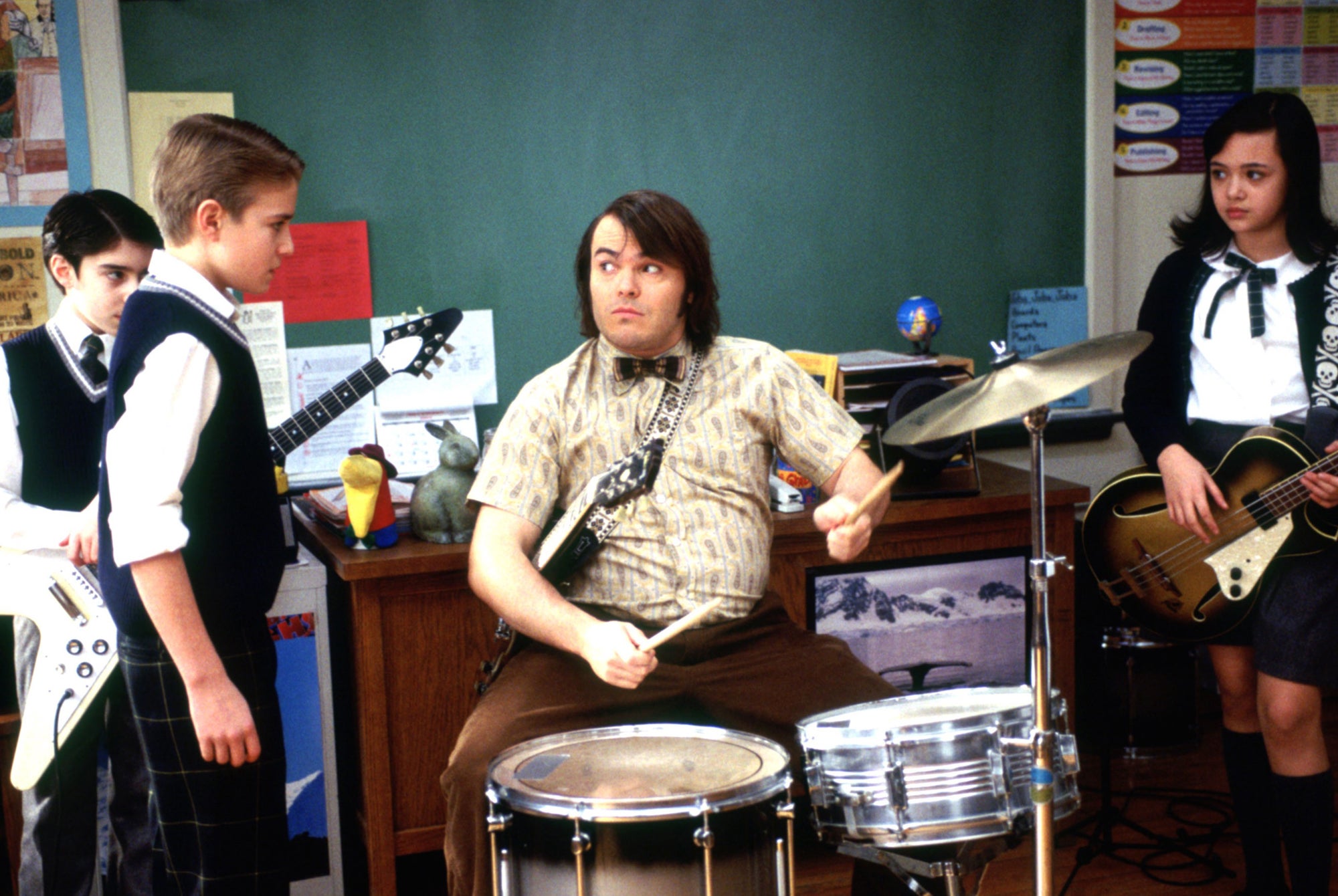Richard Linklater interview: 'Everybody Wants Some is a continuation of Boyhood'
The Texan filmmaker discusses new coming-of-age comedy Everybody Wants Some!!, his working relationship with Ethan Hawke and Jesse and Céline's uncertain future

Your support helps us to tell the story
From reproductive rights to climate change to Big Tech, The Independent is on the ground when the story is developing. Whether it's investigating the financials of Elon Musk's pro-Trump PAC or producing our latest documentary, 'The A Word', which shines a light on the American women fighting for reproductive rights, we know how important it is to parse out the facts from the messaging.
At such a critical moment in US history, we need reporters on the ground. Your donation allows us to keep sending journalists to speak to both sides of the story.
The Independent is trusted by Americans across the entire political spectrum. And unlike many other quality news outlets, we choose not to lock Americans out of our reporting and analysis with paywalls. We believe quality journalism should be available to everyone, paid for by those who can afford it.
Your support makes all the difference.Richard Linklater is more than a name - he's an adjective.
Much like David Lynch's name heralds the downright uncanny and Quentin Tarantino will forever be synonymous with extreme violence (and dodgy third acts), Linklater is a director whose films are relatable snapshots of life; the act of settling down to one can be likened to opening the curtains and peering out the living room window.
Linklater's characters are more than creations on a page. Instead, they're people you know: the sensitive kid uncertain about their future, the bullish college senior you love to hate, the girl next door. In the case of new film, Everybody Wants Some!!, it's a ragtag bunch of college baseball players.
In town to promote the 1980-set coming-of-age comedy, Linklater - chillaxing in a comfy armchair in London's Soho Hotel - belies the status of someone whose surname has become part of modern day vernacular. Not that he thinks it, of course. "An adjective! How is that even a thing," he says, chuckling in disbelief.
Earning the feat with three key 90s films - Slacker (1991), Dazed and Confused (1993) and Before Sunrise (1995) - the naturalistic plotting of his key films usually see the stories interspersed across a single day. In 2014, he boldly traded that trusted formula in for Boyhood, a tale that saw him spend 12 years tracking the life of a child from early adolescence through to adulthood.
Settling down for our 25-minute conversation, I press the 55-year-old - surely he can see why his name carries such heft?
"I guess I've heard a lot of people in relationships go, 'Oh I met a girl…'" he says in reference to his Before trilogy starring Ethan Hawke and Julie Delpy who begin wide-eyed lovers and end... well, that's for you to find out.
"That only ever happens once or twice in a lifetime. Y'know... I made a movie or two about it."
Are you aware that the films you make - with their relatable subject matter and loosely-structured narrative - have such a profound effect on your audience?
No, not really. I don’t think you can. Really. You’re always just trying to make your film, tell the story you’re trying to tell - best you can, you know. I wanna be moved by it so when people connect with it, I can honestly say, ‘Well that’s the goal.’ I want to have a connection. I want to communicate. It's great when it feels like it connects. That’s good.
What initially drew you to making these types of film? They really are snapshots of life. Is it a case of walking down the street and seeking the beauty in the mundane?

Watch Apple TV+ free for 7 days
New subscribers only. £8.99/mo. after free trial. Plan auto-renews until cancelled

Watch Apple TV+ free for 7 days
New subscribers only. £8.99/mo. after free trial. Plan auto-renews until cancelled
I think I have a low threshold of what a movie can be. So I’m always thinking 'Can you make the whole movie about that?' I’m kind of a minimalist. I’m like, 'Can a movie be about something so simple?' Every film’s different, every story is so different. But I think I’ve always been attracted to try to take something minimal and to maximize it cinematically. To find out if I can I really go all the way with one idea.
Being unattached from big budget theatrics must free you up somewhat.
Yeah, I think that goes hand in hand with expectations - big budget [means] you better deliver big goods. There’s an inflation in storytelling that cinema’s been very good at from the get go and to sustain a story, you better have a lot going on; you better have a big ending.
That's what the contradiction was in Boyhood because it’s this epic structure - 12 years - you see people grow up; it's 2 hours and 40 minutes - it’s a long movie - it’s big but the scale of it's so intimate. Most epics have epic subject matter, but I made an intimate epic. It’s weird - it doesn’t happen a lot.
Just the fact you’re making a movie about it is kind of epic to begin with. You’re saying, ‘This little subject here is worthy of a movie,’ you know; all the money and time and effort. You’re kind of elevating something just by nature, just by filming it. So when you make a whole movie just about the connection between two people, you’re elevating it.

Some of your films are so heavily layered with nostalgia; does this open up a collaboration with your actors when it comes to the scriptwriting process?
Never really, no. Everybody Wants Some!! was scripted, it was very specific. None of my cast was anywhere near being born around the time this film happens [it's set in 1980]. It was so much out of my own college experience. That said, I cast a bunch of former athletes who had their own careers - that’s when you bring in their own experience, their sense of humour. But it’s kind of within their character and the boundaries of the structure of the film - so it’s at once very collaborative and open and yet there are pretty strict boundaries. I guess.
When did you decide to make a film about a group of-
-a group of testosterone-laced boys...
Well, college baseball players, yeah.
Probably around the same time I started making Boyhood actually. Early century - 2002 - I started thinking about it. I had a script around 2005. The whole time I was doing Boyhood, this was in process. I tried to make it around ’09, ’10 - and I had this ending all along and I’m not so sure that I didn’t crib the ending of this movie onto Boyhood. This ending was written years before I filmed the Boyhood ending but I always knew it was ending with [Mason] going off to college. Then he meets a girl. So there’s some blurry line between how Boyhood ends and this begins and it just happened that the two films came right after the other. But at the same time, there's definitely a continuation element to them.
With all the talk of the film being a 'spiritual sequel' to Dazed and Confused, would it be more fitting to say that it's more closely related to Boyhood?
Yeah, well it’s a continuation of Boyhood in a strange way but, time wise and setting, it’s a sequel to Dazed. Spiritually, it’s as much a continuation of Boyhood - it's very different, though. Everybody Wants Some!! is like a different part of me; the carousing athlete that I was.
Still are, come on!
Can be. If you get me with the right people at the right time.
Writing, directing - what comes to you more readily?
God, they’re one and the same really. I don’t think much about it. Directing’s more fun, more communal. I like it; I like being with a bunch of people and trying to originate something, to talk about characters, storytelling… that’s when it feels alive. But you have to do the writing part, that’s just a given - you’ve got to put that time in. Every stage of filmmaking’s important while you’re doing it, so I spend most of my time figuring out how to tell the story. I have all these stories and ideas but it’s how to tell the story.
Boyhood, my first draft - usually I have an outline; I know the ending before I’m even writing it - but I wrote like 180 pages. It was everything and it covered the whole freshman year. [It was] too sprawling, too much sports, too much school - a lot of fun stuff - so I kind of thought, it doesn’t really work for me in that film. It was too long anyway so I just compressed it into my favourite part of the film, which was the opening weekend when he first shows up at college. So that was the restructuring that happened early on, between first and second draft.
Do you tend to restructure your scripts a lot?
Not really. Usually, I have it pretty outlined. That was rare for me - to kind of have a bigger reconceptualising after writing it. Usually, by the time I’m writing it, I have it pretty mapped out.
So, the Before films were-
-yeah, they’re all very structured. I always had the ending before we’d even… I’m a big outline guy.
I watched Before Midnight for the first time recently and the ending at once broke my heart and reassured me that it’s all going to be okay.
[laughs]
But I still don't know what to think! Do you have a clear idea what the future has in store for Jesse and Céline?
That’s a tough one. It really depends. The movie is sort of a Rorschach test for friends who are like ‘Ah, me and my partner were gonna see it.’ I’m like, ‘I don’t know - are you guys okay? ‘cause I don’t recommend it across the board.’

People see that [ending] very definitely; people came out of that and said ‘I knew my relationship was doomed' and 'I think we should go ahead and break up,’ while others see it and find it very optimistic how they’re gonna persevere through their rough spots. So it’s just wherever your head is at any moment. You realise you know the perseverance of a long term relationship is just having to work through it if it’s worth it; if it’s not, you just have to walk away. It’s tough. You can look at it optimistically or pessimistically; it depends on your headspace.
It’s universal too - it resonates with people in their 20s as much as those in their 60s.
Yeah, I was surprised. I thought this was more for people in the middle age but I was amazed at how many young people really responded to it. I mean, looking at it, they were the kid with divorced parents who could appreciate their struggle. It's tough. There's love and there’s attachment - they’re two different things.
What would you say Jesse and Céline had by the end of Before Midnight?
[laughs] I don’t know. I think there’s still attachment but I think there’s love there; there’s still that deep bond. But sort of… you know, life is kind of redefining all your expectations and all your thoughts of what something is. Are you adapting to the reality? Or are you justifying it? These are all things to think about. In everything you do. Are you just redefining the playing field to allow yourself to be on it? Are you still in love? I don’t know - these are interesting questions.
Would you say your working relationship with Ethan Hawke is, for you, the most defining? [Linklater has worked with Hawke, Matthew McConaughey, Jack Black and Patricia Arquette on multiple occasions]
I don’t know about the most but it’s certainly the most in sheer number. Because we’ve done it more than others but there are other actors I’ve worked with two, three times, for sure, but Ethan - we just kind of clicked a long time ago so we’re just natural collaborators. We float stuff by each other but nothing ever comes of it; he’ll have a project and I’ll be like ‘Nah, not really my thing’ and it just ends there. We have things that we’ve been developing or working on that may or may not happen. Ethan’s just a guy who always has a project. We’re similar that way. So when we connect cinematically, it’s always fun.
I spoke to him last year and he told me that you both plan to do a version of King Lear when you're 90.
Well, I’m ten years older than him so I’ll be 90; he’ll be 80.
So is that something we can look forward to in many years time?
Yeah. We see the end game. It’s good to have a vision. That gives me time to really think about it. Lear’s the big one.

Is there a project that, in another 12 years, you’d have been filming on the sly right now?
No. You know, I talked about Boyhood. It got reported year one - it was Variety. They wrote a little story and I met the guy at the very end and he goes ‘Oh I broke the story!’ and I go [sarcastically] ’Yeah, you broke the story, thank you’ - because I had to talk about it over the years for people who did a little bit of research going ‘So what's this thing you’re doing that’s coming out in 2013, '14, or '15?’ and I’m like, 'Yeah, it’s just this thing I’m shooting every year. I don’t really know.’ I had nothing to say about it because it was so far away. But I never lied and said I didn’t know what they were talking about. It’s hard to keep anything secret secret; there’s a difference between low key and secret. It was hard to talk about in process.
Was there ever a worry that it wouldn't work?
Not in my mind. But I guess you don’t want to tempt fate with the obvious pitfalls of someone quitting, or something could happen physically to make it not - you know, you don’t even talk about certain things. People were always like ‘…but what if someone dies? You’ve got guts. What if he quits?’ Yeah, it could happen. It happens in life. It could happen anytime. I could die, you know. We all took a leap of faith to the future and trusted that we’d be here. Like we all do.
People really asked you what you'd do if someone died? That’s pretty dark.
Yeah, people act like it was this Herculean commitment but it kind of wasn’t. Especially once you’re older, it’s like where are you gonna be in 12 years? Doing the same shit probably, some version of what you’re doing now. I always had that long term vision. Even getting going with cinema, knowing it was such a long road to be able to make films, but I always had a long term. Whenever I was starting out, I had that patience. I guess because when you’re young you want results. And if you want immediate results - if you don’t have the gene of delayed gratification - then cinema’s not your medium. Be a performance artist, be a musician - there are more immediate art forms. Cinema’s not an immediate art form.
Would you say it’s easier or tougher to get a film made today?
Oh, easier. Absolutely. Cheaper, better, everything’s easier - technologically. But there’s subsequently so many more films being made. That used to be a hurdle; getting the equipment, film stock, the budget to process the film alone. Just the lab cost of making the cheapest 60mm film, the baseline was $20,000. So that’s kind of gone; you can get that pretty cheap - a collective of people working for nothing. You can get it done. That's a good thing.
Do you reckon you’ll do another sequel? Maybe a School of Rock follow-up?
Well, I don’t know. There’s a big broadway musical - it got a Tony nomination - there’s a TV show [on Nickelodeon], so maybe Jack [Black] and I, by not doing the sequel years ago… We never did crack a good idea for the sequel. You don’t do it just to do it, or because you want to work with somebody again because it’d be fun; you’ve got to have a reason. That’s why with the Before movies, we’re not gonna do it unless there’s something we’re really compelled to do… because it’s just too grueling.

Your filmography is split into two camps; the snapshots of life - Dazed, Boyhood, Everybody Wants Some!! - and the films that provide a unique look at worlds that would be alien to many - A Scanner Darkly, Bernie.
Have you ever seen the film Me and Orson Welles? That’s kind of my favourite. Going back in time and recreating a moment in history like that. There’s a part of me that just loves doing that. Each one just feels like a story you want to tell, and you tell it in a certain- you’re trying to figure out how to communicate the story you’re trying to tell.
So, tell me: how does Richard Linklater choose which stories he wants to tell?
Isn’t that the question? It's a big threshold - what deserves your time to try to make a movie out of it. So my gauge is just what's inside me; if I’m still thinking about something for a long time... like Bernie sat on the shelf for ten years. Everybody Wants Some!! sat on the shelf. School of Rock happened more quickly. Me and Orson Welles happened fairly quickly - so different gestation periods. But I like all that time to think about it, to gestate on a movie. Waking Life I thought about for years and years and years; just how to crack it. So I like that.
Of all the stories in the world, which is endless, every day you come across stories that could be compelling as movies But what makes you really hunker down and want to make a movie about that. And that’s bit of a mystery. Is it obsession? Usually, there’s something at the core of it that’s kind of mysterious, you're trying to find out something, to discover something yourself or explore a relationship. I could go through every film and say what I was trying to find.
It's definitely something that’s deeply compelling - kind of to the point of obsession. You have to have that going in. It's like that Kubrick line: ‘Don’t ever make a story that you’re not completely in love with because the effort is so enormous that you’re gonna be spending a lot of time there.’ So by the time I'm making something, I ask 'Will I still find this compelling when I'm done?' So that’s kind of my own personal litmus test.
Everybody Wants Some!! is available on Digital Download and Blu-ray & DVD now
Join our commenting forum
Join thought-provoking conversations, follow other Independent readers and see their replies
Comments